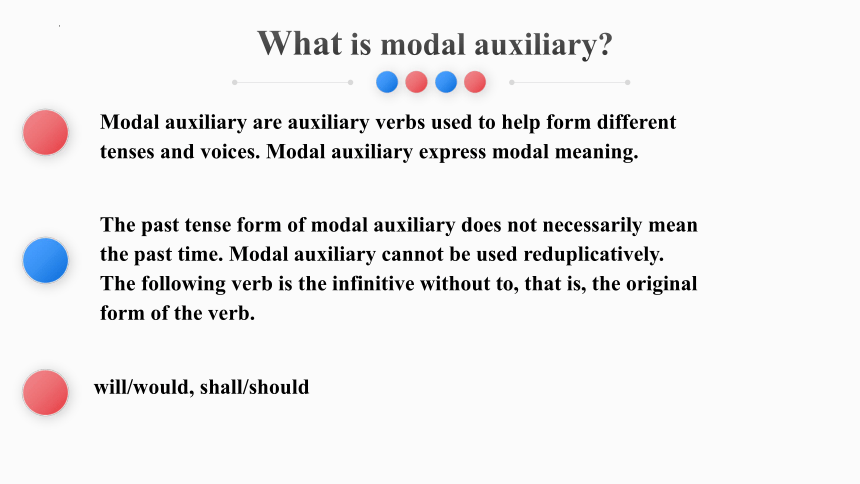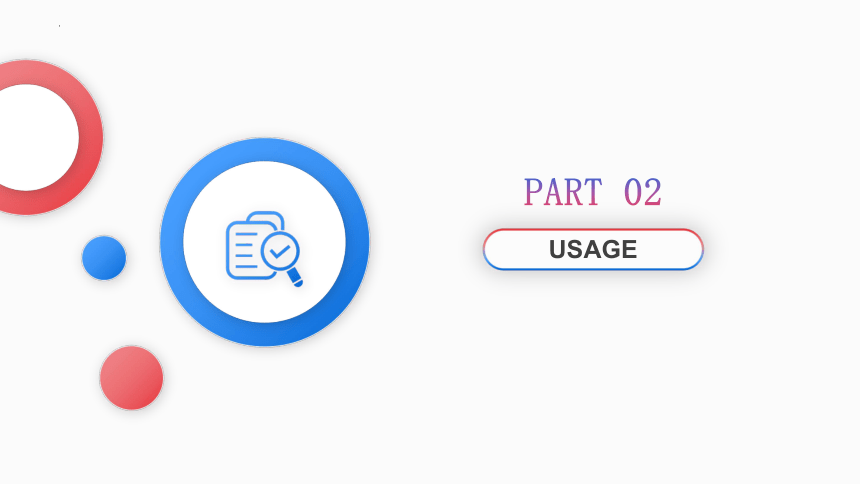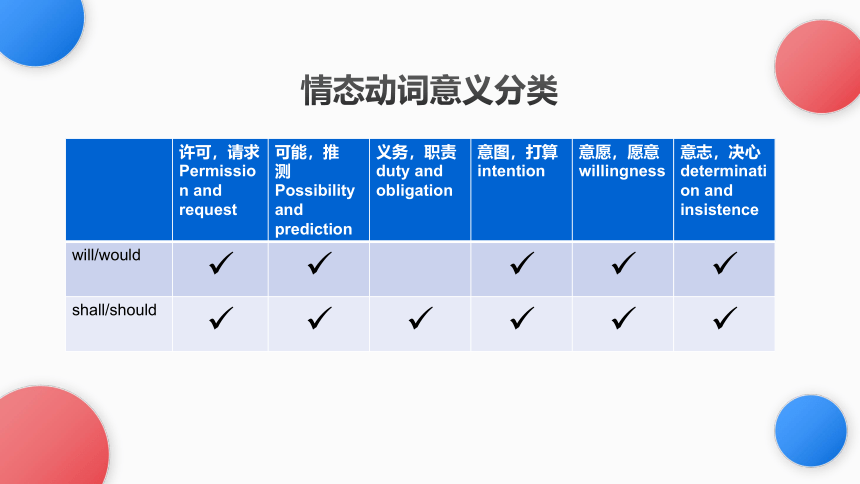2023届高考英语一轮复习情态动词复习课件(18张ppt)
文档属性
| 名称 | 2023届高考英语一轮复习情态动词复习课件(18张ppt) |

|
|
| 格式 | pptx | ||
| 文件大小 | 157.1KB | ||
| 资源类型 | 教案 | ||
| 版本资源 | 通用版 | ||
| 科目 | 英语 | ||
| 更新时间 | 2022-11-12 00:00:00 | ||
图片预览







文档简介
(共18张PPT)
情态动词
01
02
03
Concept
Usage
Practice
Modal Auxiliary
CONCEPT
PART 01
Modal auxiliary are auxiliary verbs used to help form different tenses and voices. Modal auxiliary express modal meaning.
The past tense form of modal auxiliary does not necessarily mean the past time. Modal auxiliary cannot be used reduplicatively. The following verb is the infinitive without to, that is, the original form of the verb.
What is modal auxiliary
will/would, shall/should
USAGE
PART 02
许可,请求 Permission and request 可能,推 测 Possibility and prediction 义务,职责 duty and obligation 意图,打算 intention 意愿,愿意 willingness 意志,决心
determination and insistence
will/would
shall/should
情态动词意义分类
will/would:1. Represents a request. It will be more polite to use “would”.
Will/Would you pass me the salt, please 请把盐递过来,好吗?
2. Generally used in the second person interrogative sentence.
Will/Would you spell your name 请你拼一下你的名字好吗?
3.A interrogative answer, usually “sure, certainly”.
shall:1. It is used to ask for advice and guidance from others.
Shall we take umbrella with us 我们带雨伞好吗?
2. Generally used in the first and third person questions.
Shall I open the window 我可以开窗户吗?
Shall he come to see you 要不要他来看你?
3. Affirmative answer, usually “of course; certainly; yes, please”.
Negative answer, usually “no, thanks”.
1.许可,请求
permission and request
2.可能,预测
possibility and prediction
will/would:1.1) Indicates the speaker's prediction of the future and the present. The current forecast is sure to happen.
I think he will be all right now. 我想他现在一定好了。
That would be his mother. 那肯定是他母亲。
2) Sometimes it indicates a certain tendency and habit.
Oil will float on water. 油浮在水面上。
He‘ll talk for hours if you give the chance. 如果给他机会,他会谈上几个小时。
On the magnetic equator the needle would remain horizontal. 在磁赤道上磁针会保持水平。
2. “Would” can mean doing something often in the past 。
He would get up very early. 过去他常常起的很早。
shall/should:
1. Indicates the speaker's guess that something should happen.
I shall be rich one day. 总有天我会发财的。
That should be Janet coming upstairs now. 正在上楼的准是珍妮特。
2. It is mostly used in the first person.
shall/should:
1. “Shall” is used in treaties, regulations, decrees and other documents to express obligations and provisions.
Each player shall wear a number. 每个运动员必须带上号。
Should means the duty and obligation of the subject or the advice of the speaker. It emphasizes subjectivity and is not as arbitrary as the using “must”.
You shouldn't judge a man always by the clothes. 你不应该总是以貌取人。
2. Usually used in the third person.
The new regulation shall take effect Oct. 1st. 新章程十月一实施。
3.应该,必须(义务)
duty and obligation
will/would:
1. It is used to express "intention". It is mainly used in the first person. “Will” is not stressed and can be abbreviated.
I'll write as soon as I can. 我会尽快写信。
Will you accept his offer 你愿意接受他的报价吗?
2. Used in conditional sentences, used in various persons.
Who will go with me 谁愿意和我去?
We won't stay there too long. 我们不愿在那多呆的太久。
4.意图,打算
intention
shall/should:
1. Used for the speaker‘s intention. It is interchangeable with “will”.
We shall not/won't go if it rains. 如果下雨,我们不打算走了。
2. Can only be used in the first person.
I shall not stay here long. 我不打算在这呆很长时间。
will/would:
1. Indicates the will of the subject.
He will help you if you ask him. 如果你问他,他会帮助你的。
“Would” is more tactful than “will”.
Would/Will you have another cup of tea 你想再来一杯茶吗?
2. It is used in affirmative sentences for various persons, and in second and third person questions to ask whether others are willing to do something. It can be used in conditional sentences.
Will you have some tea. 你想喝茶吗?
If he will he can come. 如果他愿意,他可以来。
Would you excuse me (婉转) 你能原谅我吗?
3. affirmative answer, usually "yes, of course”.
5.意愿
willingness
shall/should:
1. Indicates the speaker’s willingness.
He shall get his money. 他想拿到他的钱。
You should stay here as long as you like.只要你乐意,你就呆在这。
2. Generally used in affirmative sentences, for the second and third person. In the interrogative sentence, it means to ask the listener whether he is willing to do something.
Shall you do some shopping with me 你愿意和我一起买东西去吗?。
will/would:
1. Indicates the will of the subject. Abbreviations cannot be used. It should be stressed.
I 'will stop smoking. 我决心戒烟了。
He 'will do it whenever you say. 你什么时候说,他都一定会做的。
It's your own fault. You would take the baby with you. 是你自己的过错,你非要带着孩子。
2. Used in the second or third person to express anger at others. Can be used in conditional sentences.
I 'will have my own way. 我要走自己的路。
He won't do what he's told. 他不会做别人让他 干的事。
Will you come this way, please. 你这边走不行吗?
If you 'will go,you may go at once. 如果你非走不可,你可以马上走。
6.决心
insistence and determination
shall/should:
1. Indicates the speaker's will and determination. “Shall” should be stressed.
You 'shall marry him. 我坚持你应和他结婚。
No one 'shall stop me. 不许任何人阻止我。
2. Only used in the second and third person affirmative sentences.
You 'shall obey orders. 我要你服从命令。
The enemy 'shall not pass. 决不让敌人过去。
Practice
PART 03
1.You _____ do as he says.
你应该照他说的去做。
2.______ you mind closing the door
请把门关上。
3. You _______ not answer her back.
你不可以再跟他顶嘴。
4. Don’t call him. He _____ be sleeping.
别给他打电话,估计他在睡午觉。
should
Would
shall
will
Banked Cloze. (shall/should/will/would)
感谢观看
情态动词
01
02
03
Concept
Usage
Practice
Modal Auxiliary
CONCEPT
PART 01
Modal auxiliary are auxiliary verbs used to help form different tenses and voices. Modal auxiliary express modal meaning.
The past tense form of modal auxiliary does not necessarily mean the past time. Modal auxiliary cannot be used reduplicatively. The following verb is the infinitive without to, that is, the original form of the verb.
What is modal auxiliary
will/would, shall/should
USAGE
PART 02
许可,请求 Permission and request 可能,推 测 Possibility and prediction 义务,职责 duty and obligation 意图,打算 intention 意愿,愿意 willingness 意志,决心
determination and insistence
will/would
shall/should
情态动词意义分类
will/would:1. Represents a request. It will be more polite to use “would”.
Will/Would you pass me the salt, please 请把盐递过来,好吗?
2. Generally used in the second person interrogative sentence.
Will/Would you spell your name 请你拼一下你的名字好吗?
3.A interrogative answer, usually “sure, certainly”.
shall:1. It is used to ask for advice and guidance from others.
Shall we take umbrella with us 我们带雨伞好吗?
2. Generally used in the first and third person questions.
Shall I open the window 我可以开窗户吗?
Shall he come to see you 要不要他来看你?
3. Affirmative answer, usually “of course; certainly; yes, please”.
Negative answer, usually “no, thanks”.
1.许可,请求
permission and request
2.可能,预测
possibility and prediction
will/would:1.1) Indicates the speaker's prediction of the future and the present. The current forecast is sure to happen.
I think he will be all right now. 我想他现在一定好了。
That would be his mother. 那肯定是他母亲。
2) Sometimes it indicates a certain tendency and habit.
Oil will float on water. 油浮在水面上。
He‘ll talk for hours if you give the chance. 如果给他机会,他会谈上几个小时。
On the magnetic equator the needle would remain horizontal. 在磁赤道上磁针会保持水平。
2. “Would” can mean doing something often in the past 。
He would get up very early. 过去他常常起的很早。
shall/should:
1. Indicates the speaker's guess that something should happen.
I shall be rich one day. 总有天我会发财的。
That should be Janet coming upstairs now. 正在上楼的准是珍妮特。
2. It is mostly used in the first person.
shall/should:
1. “Shall” is used in treaties, regulations, decrees and other documents to express obligations and provisions.
Each player shall wear a number. 每个运动员必须带上号。
Should means the duty and obligation of the subject or the advice of the speaker. It emphasizes subjectivity and is not as arbitrary as the using “must”.
You shouldn't judge a man always by the clothes. 你不应该总是以貌取人。
2. Usually used in the third person.
The new regulation shall take effect Oct. 1st. 新章程十月一实施。
3.应该,必须(义务)
duty and obligation
will/would:
1. It is used to express "intention". It is mainly used in the first person. “Will” is not stressed and can be abbreviated.
I'll write as soon as I can. 我会尽快写信。
Will you accept his offer 你愿意接受他的报价吗?
2. Used in conditional sentences, used in various persons.
Who will go with me 谁愿意和我去?
We won't stay there too long. 我们不愿在那多呆的太久。
4.意图,打算
intention
shall/should:
1. Used for the speaker‘s intention. It is interchangeable with “will”.
We shall not/won't go if it rains. 如果下雨,我们不打算走了。
2. Can only be used in the first person.
I shall not stay here long. 我不打算在这呆很长时间。
will/would:
1. Indicates the will of the subject.
He will help you if you ask him. 如果你问他,他会帮助你的。
“Would” is more tactful than “will”.
Would/Will you have another cup of tea 你想再来一杯茶吗?
2. It is used in affirmative sentences for various persons, and in second and third person questions to ask whether others are willing to do something. It can be used in conditional sentences.
Will you have some tea. 你想喝茶吗?
If he will he can come. 如果他愿意,他可以来。
Would you excuse me (婉转) 你能原谅我吗?
3. affirmative answer, usually "yes, of course”.
5.意愿
willingness
shall/should:
1. Indicates the speaker’s willingness.
He shall get his money. 他想拿到他的钱。
You should stay here as long as you like.只要你乐意,你就呆在这。
2. Generally used in affirmative sentences, for the second and third person. In the interrogative sentence, it means to ask the listener whether he is willing to do something.
Shall you do some shopping with me 你愿意和我一起买东西去吗?。
will/would:
1. Indicates the will of the subject. Abbreviations cannot be used. It should be stressed.
I 'will stop smoking. 我决心戒烟了。
He 'will do it whenever you say. 你什么时候说,他都一定会做的。
It's your own fault. You would take the baby with you. 是你自己的过错,你非要带着孩子。
2. Used in the second or third person to express anger at others. Can be used in conditional sentences.
I 'will have my own way. 我要走自己的路。
He won't do what he's told. 他不会做别人让他 干的事。
Will you come this way, please. 你这边走不行吗?
If you 'will go,you may go at once. 如果你非走不可,你可以马上走。
6.决心
insistence and determination
shall/should:
1. Indicates the speaker's will and determination. “Shall” should be stressed.
You 'shall marry him. 我坚持你应和他结婚。
No one 'shall stop me. 不许任何人阻止我。
2. Only used in the second and third person affirmative sentences.
You 'shall obey orders. 我要你服从命令。
The enemy 'shall not pass. 决不让敌人过去。
Practice
PART 03
1.You _____ do as he says.
你应该照他说的去做。
2.______ you mind closing the door
请把门关上。
3. You _______ not answer her back.
你不可以再跟他顶嘴。
4. Don’t call him. He _____ be sleeping.
别给他打电话,估计他在睡午觉。
should
Would
shall
will
Banked Cloze. (shall/should/will/would)
感谢观看
